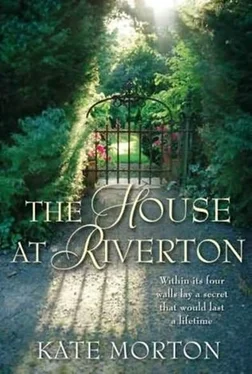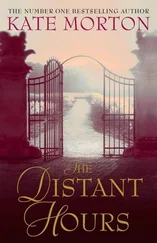I had learned to read at the village school and my teacher, Miss Ruby, pleased I expect to encounter such uncommon student interest, had started loaning me books from her own collection: Jane Eyre , Frankenstein , The Castle of Otranto . When I returned them we would discuss our favourite parts. It was Miss Ruby who suggested I might become a teacher myself. Mother had been none too pleased when I told her. She’d said it was all very well for Miss Ruby to go putting grand ideas in my head but ideas didn’t put bread and butter on the table. Not long after she’d sent me up the hill to Riverton, to Myra and Mr Hamilton, and to the nursery…
And for a time the nursery was my room, the books my books.
But one day a fog blew in and it began to rain. As I hurried along the corridor with half a mind to look at an illustrated children’s encyclopaedia I’d discovered the day before, I stopped short. There were voices inside.
It was the wind, I told myself, carrying them from elsewhere in the house. An illusion. But when I cracked open the door and peeked inside: shock. There were people in there. Young people who fit perfectly in that enchanting room.
And in that instant, with neither sign nor ceremony, it ceased to be mine. I stood, frozen by indecision, unsure whether it was proper to continue my duties or to return later. I peeked again, made timid by their laughter. Their confident, round voices. Their shiny hair and shinier hair bows.
It was the flowers that decided me. They were wilting in their vase atop the fire mantle. Petals had dropped in the night and now lay scattered like a rebuke. I couldn’t risk Myra seeing them; she had been clear on my duties. Had made certain I understood that Mother would learn if I were to run foul of my superiors.
Remembering Mr Hamilton’s instructions, I clutched my brush and broom to my chest and tiptoed to the fireside, concentrated on being invisible. I needn’t have worried. They were used to sharing their homes with an army of the unseen. They ignored me while I pretended to ignore them.
Two girls and a boy: the youngest around ten, the eldest not yet seventeen. All three shared the distinctive Ashbury colouring-golden hair and eyes the fine, clear blue of Wedgwood porcelain-the legacy of Lord Ashbury’s mother, a Dane who (so said Myra) had married for love and been disowned, her dowry withdrawn. (She’d had the last laugh though, said Myra, when her husband’s brother passed and she became Lady Ashbury of the British Empire.)
The taller girl stood in the centre of the room, wielding a handful of papers as she described the niceties of leprous infections. The younger sat on the floor, legs crossed, watching her sister with widening blue eyes, her arm draped absently around Raverley’s neck. I was surprised, and a little horrified, to see he had been dragged from his corner and was enjoying a rare moment of inclusion. The boy knelt on the window seat, gazing down through the fog toward the churchyard.
‘And then you turn around to face the audience, Emmeline, and your face will be completely leprous,’ the taller girl said gleefully.
‘What’s leprous?’
‘A skin disease,’ the older girl said. ‘Lesions and mucus, the usual stuff.’
‘Perhaps we could have her nose rot off, Hannah,’ said the boy, turning to wink at Emmeline.
‘Yes,’ said Hannah seriously. ‘Excellent.’
‘No,’ Emmeline wailed.
‘Honestly Emmeline, don’t be such a baby. It’s not really going to rot off,’ Hannah said. ‘We’ll make some kind of mask. Something hideous. I’ll see if I can find a medical book in the library. Hopefully there’ll be pictures.’
‘I don’t see why I have to be the one to get leprosy,’ Emmeline said.
‘Take it up with God,’ Hannah said. ‘He wrote it.’
‘But why do I have to play Miriam. Can’t I play a different part?’
‘There are no other parts,’ Hannah said. ‘David has to be Aaron, because he’s the tallest, and I’m playing God.’
‘Can’t I be God?’
‘Certainly not. I thought you wanted the main part.’
‘I did,’ Emmeline said. ‘I do.’
‘Well then. God doesn’t even get to be on stage,’ Hannah said. ‘I have to do my lines from behind a curtain.’
‘I could play Moses,’ Emmeline said. ‘Raverley can be Miriam.’
‘You’re not playing Moses,’ Hannah said. ‘We need a real Miriam. She’s far more important than Moses. He only has one line. That’s why Raverley’s standing in. I can say his line from behind my curtain-I may even cut Moses altogether.’
‘Perhaps we could do another scene instead,’ Emmeline said hopefully. ‘One with Mary and the baby Jesus?’
Hannah huffed disgustedly.
They were rehearsing a play. Alfred the footman had told me there was to be a family recital on the bank holiday weekend. It was a tradition: some family members sang, others recited poetry, the children always performed a scene from their grandmother’s favourite book.
‘We’ve chosen this scene because it’s important,’ said Hannah.
‘ You’ve chosen it because it’s important,’ said Emmeline.
‘Exactly,’ said Hannah. ‘It’s about a father having two sets of rules: one for his sons and one for his daughters.’
‘Sounds perfectly reasonable to me,’ said David ironically.
Hannah ignored him. ‘Both Miriam and Aaron are guilty of the same thing: discussing their brother’s marriage-’
‘What were they saying?’ Emmeline said.
‘It’s not important, they were just-’
‘Were they saying mean things?’
‘No, and it’s not the point. The important thing is that God decides Miriam should be punished with leprosy while Aaron gets no worse than a talking-to. Does that sound fair to you, Emme?’
‘Didn’t Moses marry an African woman?’ Emmeline said.
Hannah shook her head, exasperated. She did that a lot, I noticed. A fierce energy infused her every long-limbed movement, led her easily to frustration. Emmeline, by contrast, had the calculated posture of a doll come to life. Their features, similar when considered individually-two slightly aquiline noses, two pairs of intense blue eyes, two pretty mouths-manifested themselves uniquely on each girl’s face. Where Hannah gave the impression of a fairy queen-passionate, mysterious, compelling-Emmeline’s was a more accessible beauty. Though still a child, there was something in the way her lips parted in repose, her too-wide-open eyes, that reminded me of a glamour photograph I had once seen when it fell from the peddler’s pocket.
‘Well? He did, didn’t he?’ Emmeline said.
‘Yes, Emme,’ David said, laughing. ‘Moses married an Ethiopian. Hannah’s just frustrated that we don’t share her passion for women’s suffrage.’
‘Hannah! He doesn’t mean it. You’re not a suffragette. Are you?’
‘Of course I am,’ Hannah said. ‘And so are you.’
Emmeline lowered her voice. ‘Does Pa know? He’ll be ever so cross.’
‘Pooh,’ said Hannah. ‘Pa’s a kitten.’
‘A lion, more like,’ said Emmeline, lips trembling. ‘Please don’t make him cross, Hannah.’
‘I shouldn’t worry, Emme,’ said David. ‘Suffrage is all the fashion amongst society women at the moment.’
Emmeline looked doubtful. ‘Fanny never said anything.’
‘Anyone who’s anyone will be wearing a dinner suit for her debut this season,’ said David.
Emmeline’s eyes widened.
I listened from the bookshelves, wondering what it all meant. I had never heard the word ‘suffragette’ before, but had a vague idea it might be a sort of illness, the likes of which Mrs Nammersmith in the village had caught when she took her corset off at the Easter parade, and her husband had to take her to the hospital in London.
Читать дальше












